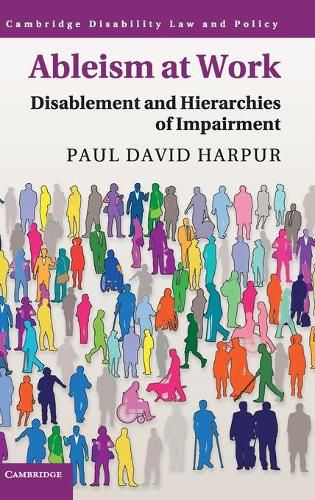Readings Newsletter
Become a Readings Member to make your shopping experience even easier.
Sign in or sign up for free!
You’re not far away from qualifying for FREE standard shipping within Australia
You’ve qualified for FREE standard shipping within Australia
The cart is loading…






The UN Convention on the Rights of Persons with Disabilities promotes ability equality, but this is not experienced in national laws. Australia, Canada, Ireland, the UK and the US all have one thing in common: regulatory frameworks which treat workers with psychosocial disabilities less favorably than workers with either physical or sensory disabilities. Ableism at Work is a comprehensive and comparative legal, practical and theoretical analysis of workplace inequalities experienced by workers with psychosocial disabilities. Whether it be denying anti-discrimination protection to people with episodic disabilities, addictions or other psychological impairments, failing to make reasonable accommodations/adjustments for workers with psychosocial disabilities, or denying them workers’ compensation or occupational health and safety protections, regulatory interventions imbed inequalities. Ableism, sanism and prejudice are expressly stated in laws, reflected in judgments, and perpetuated by workplace practices and this book enables advocates, policy makers and lawmakers to understand the wider context in which systems discriminate workers with psychosocial disabilities.
$9.00 standard shipping within Australia
FREE standard shipping within Australia for orders over $100.00
Express & International shipping calculated at checkout
The UN Convention on the Rights of Persons with Disabilities promotes ability equality, but this is not experienced in national laws. Australia, Canada, Ireland, the UK and the US all have one thing in common: regulatory frameworks which treat workers with psychosocial disabilities less favorably than workers with either physical or sensory disabilities. Ableism at Work is a comprehensive and comparative legal, practical and theoretical analysis of workplace inequalities experienced by workers with psychosocial disabilities. Whether it be denying anti-discrimination protection to people with episodic disabilities, addictions or other psychological impairments, failing to make reasonable accommodations/adjustments for workers with psychosocial disabilities, or denying them workers’ compensation or occupational health and safety protections, regulatory interventions imbed inequalities. Ableism, sanism and prejudice are expressly stated in laws, reflected in judgments, and perpetuated by workplace practices and this book enables advocates, policy makers and lawmakers to understand the wider context in which systems discriminate workers with psychosocial disabilities.